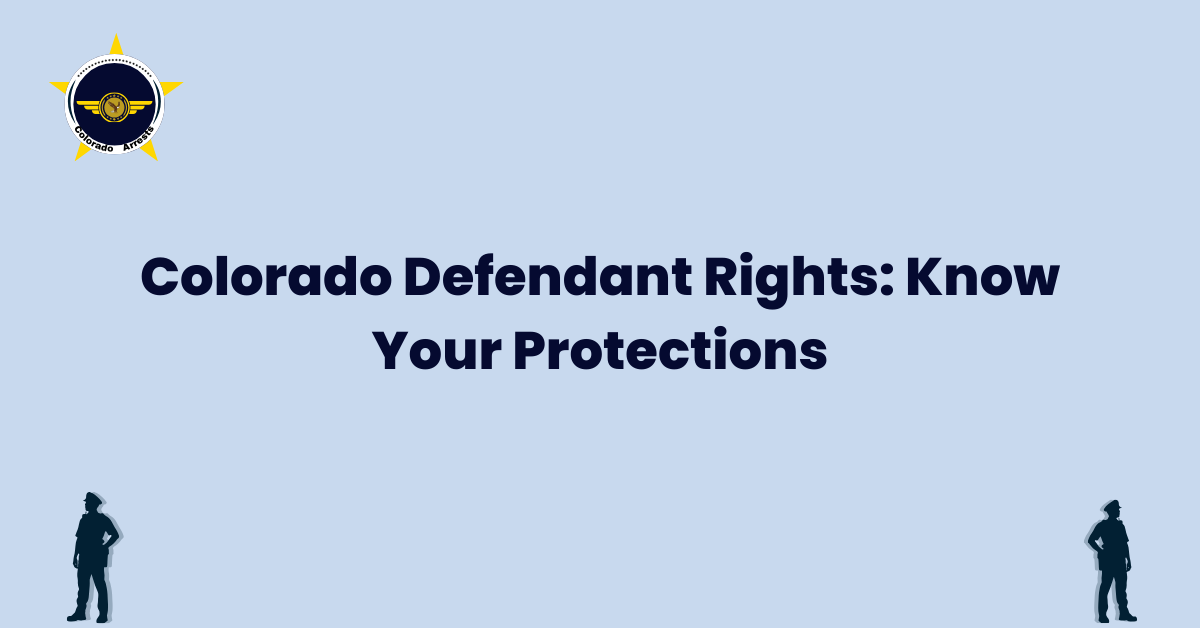Colorado Defendant Rights Know Your Protections
Understanding your rights as a defendant is crucial in any legal process. Whether you find yourself involved in a criminal case or facing a civil lawsuit, knowing your protections is essential to ensure a fair and just outcome. In the state of Colorado, defendant rights are upheld and respected, providing individuals with the necessary safeguards throughout the legal proceedings.
From the moment you are accused of a crime or become a party to a lawsuit, the Colorado legal system guarantees certain rights to protect your interests. These rights encompass various aspects of the legal process, including the right to legal representation, the right to a fair trial, and the right to confront witnesses. By understanding and asserting these rights, you can actively participate in your defense and safeguard your interests throughout the legal journey.
Navigating the Right to Legal Representation
One of the fundamental rights guaranteed to defendants in the Colorado legal system is the right to legal representation. This means that if you are accused of a crime or involved in a lawsuit, you have the right to have an attorney represent your interests throughout the legal process.
Having legal representation is crucial as it ensures that your rights are protected, and you have someone knowledgeable and experienced advocating for your best interests. Your attorney will guide you through the complex legal proceedings, provide expert advice, and help you make informed decisions.
Ensuring a Fair Trial
The right to a fair trial is another essential aspect of defendant rights in Colorado. A fair trial ensures that both parties have an equal opportunity to present their case and that the proceedings are conducted impartially.
During a trial, the judge ensures that the rules of evidence are followed, and both sides have a chance to present their arguments and cross examine witnesses. This ensures that the truth is uncovered and that justice is served.
The Right to Confront Witnesses
In the Colorado legal system, defendants have the right to confront witnesses against them. This means that if someone is testifying against you, you have the opportunity to question and challenge their credibility.
This right is crucial as it allows you to present your side of the story and challenge any inconsistencies or biases in the testimony of witnesses. It ensures that the truth is thoroughly examined and that you have a fair chance to defend yourself.
Presumption of Innocence
Another important aspect of defendant rights in Colorado is the presumption of innocence. This means that you are considered innocent until proven guilty beyond a reasonable doubt.
This presumption is the cornerstone of a fair legal system and ensures that you are not unfairly prejudiced or treated as guilty before the trial even begins. It places the burden of proof on the prosecution to prove your guilt, rather than on you to prove your innocence.
Protection against Self Incrimination
In the Colorado legal system, defendants have the right to remain silent and not incriminate themselves. This protection is known as the right against self incrimination.
This right allows you to choose whether or not to testify in your own defense and prevents any coerced confessions or statements from being used against you. It ensures that you are not forced to provide evidence that could be used to incriminate you.
FAQs
What are defendant rights in Colorado?
Defendant rights in Colorado refer to the legal protections and safeguards provided to individuals involved in criminal cases or facing civil lawsuits. These rights ensure a fair and just outcome throughout the legal proceedings.
What is the right to legal representation?
The right to legal representation guarantees that every defendant has the right to be represented by an attorney. This ensures that defendants have access to professional legal advice and defense throughout their case.
What is the right to a fair trial?
The right to a fair trial ensures that defendants are given a fair and impartial hearing. It includes the right to an unbiased judge, an impartial jury, and the opportunity to present evidence and witnesses in their defense.
What is the right to confront witnesses?
The right to confront witnesses allows defendants to question and cross examine witnesses presented against them. This ensures that defendants have the opportunity to challenge witness testimony and credibility.
Are these rights applicable to both criminal and civil cases?
Yes, defendant rights in Colorado apply to both criminal and civil cases. Whether you are accused of a crime or involved in a civil lawsuit, these rights protect your interests and ensure a fair legal process.
How can understanding and asserting these rights help me?
Understanding and asserting your defendant rights in Colorado allows you to actively participate in your defense. By knowing your protections, you can work with your attorney to ensure a strong defense strategy and safeguard your interests throughout the legal journey.
Conclusion
Understanding and asserting your rights as a defendant is crucial in any legal process. In Colorado, defendant rights are upheld and respected, providing you with the necessary safeguards throughout the legal proceedings.
By knowing your rights to legal representation, a fair trial, the right to confront witnesses, the presumption of innocence, and protection against self incrimination, you can actively participate in your defense and safeguard your interests throughout the legal journey.







